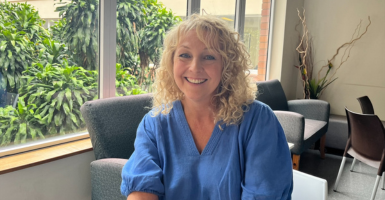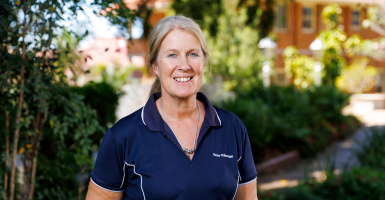Like it or not, you are a leader!
 Blog written by Melanie Barlow, Head of Research, Evaluation and Communications at Mater Education.
Blog written by Melanie Barlow, Head of Research, Evaluation and Communications at Mater Education.
We have all had moments when we wanted to be a lion: to step up, speak up and be a leader; but for many reasons we only saw ourselves as the kitten: moments where we believed that because we don’t have formal positional power, we have no right trying to be the lion and lead the way.
Throughout my career, I’ve lost count how many times I have heard the phrase “I’m just a nurse”, or ”I’m just an educator”—in fact, I’m sure I’ve used these phrases myself. There have been many moments throughout my career where I have had to speak up. I know as a Registered Nurse and as a Clinical Educator I didn’t view myself as having positional power. My title didn’t include the words ‘Manager’ or ‘Director’ and therefore I was not in a position to make decisions that had impact or real influence. This made speaking up difficult; speaking up against authority gradients, professional hierarchies and the fear of being wrong or professionally embarrassed significantly impacted my decisions in the moment, to raise my concerns and find my voice. I thought: if only I had a different title, speaking up would be so much easier!”, but I was wrong!
Although literature suggests that speaking up does become somewhat easier as individuals progress up the leadership ladder(1), in my experience, even now as a Director, it’s still not always easy. The unpredictability of how my speaking up (or feedback) message will be received, is still ever present and impactful.
We are all faced with moments in our day where we make decisions that are often in the moment and not pre-planned. Such a decision is whether to speak up when we see something that isn’t right. Making the decision in that moment to speak up absolutely has impact and can change: the direction of a conversation, the way forward, the relationship with the other person, or a patient’s outcome(2). Equally, it can be argued that how the message is received has just as much influence on others and on the outcome of the situation(3). We don’t immediately view these moments as ‘leadership moments’, but they are; they are ‘micro-leadership’ moments, and in these moments, we can all be leaders.
As part of Mater Education’s Educating the Educators Symposium, we’ll be exploring and discussing the role of educators as leaders and change agents in this space.
About the Author
Melanie is the Head of Research, Evaluation and Communications at Mater Education and is currently undertaking her PhD in healthcare communication, specifically the role the Receiver plays in speaking up conversations.
1. Schwappach, D.L. and K. Gehring, Silence that can be dangerous: a vignette study to assess healthcare professionals' likelihood of speaking up about safety concerns. PLoS One, 2014. 9 (8): p. e104720.
2. Okuyama, A., C. Wagner, and B. Bijnen, Speaking up for patient safety by hospital-based health care professionals: a literature review.(Report). BMC Health Services Research, 2014. 14 (9107).
3. Rosenstein, A.H., Nurse-physician relationships: impact on nurse satisfaction and retention. The American Journal of Nursing, 2002. 102 (6): p. 26-34.



